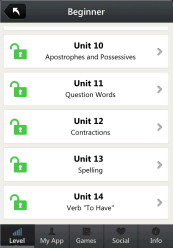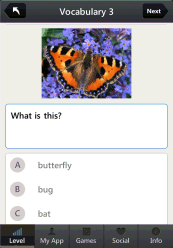English Grammar - Beginner
The Present Simple
Go To Quizzes >>> The Present Simple
We use the present simple to talk about things in general, things which are always true and habits. It's not important if the action is happening at the time of speaking.
Examples:
She works at the hospital.
I love eating fish.
The shop next to the bank sells great pizza.
Brazil exports a lot of wood to the rest of the world.
|
I You We They |
+ | Verb |
but
|
He She It |
+ | Verb | + | s |
Examples.
We go to the theatre every Friday.
They speak Spanish very well.
I love to cook at the weekend.
but:
She speaks French.
He smokes cigars and cigarettes.
The bank opens at 9 o'clock.
Present Simple Negative
Go To Quizzes >>> The Present Simple
Negative
| Subject | + |
Don't Doesn't |
+ | Infinitive Verb |
Examples:
They don't live in that house.
We don't want to stay in that hotel.
I don't think it's a good idea.
but:
Sarah doesn't write to me very often.
The President doesn't want to cut taxes.
It often doesn't rain here for months.
Present Simple Questions
Go To Quizzes >>> The Present Simple
Questions
| Question Word | + |
Do Does |
+ | Subject | + | Infinitive Verb |
Examples:
Where do you live?
What time do your sisters arrive home?
Do we leave now or at five o'clock?
but:
Does your sister work in the city?
How often does your father have a holiday?
Why does the television make that strange noise?
English Learning Lounge - iOS and Android Apps |
||

|
Our app for both Android and iOS to help you improve your English!
|

|
Short Answers
You can use a short form to give answers to questions, using only the auxiliary in the correct form.
Examples:
Q: Does Marion live in a big apartment?
A: Yes, she does. NOT Yes, she lives.
Q: Do your parents like going on winter vacations?
A: No, they don't.
